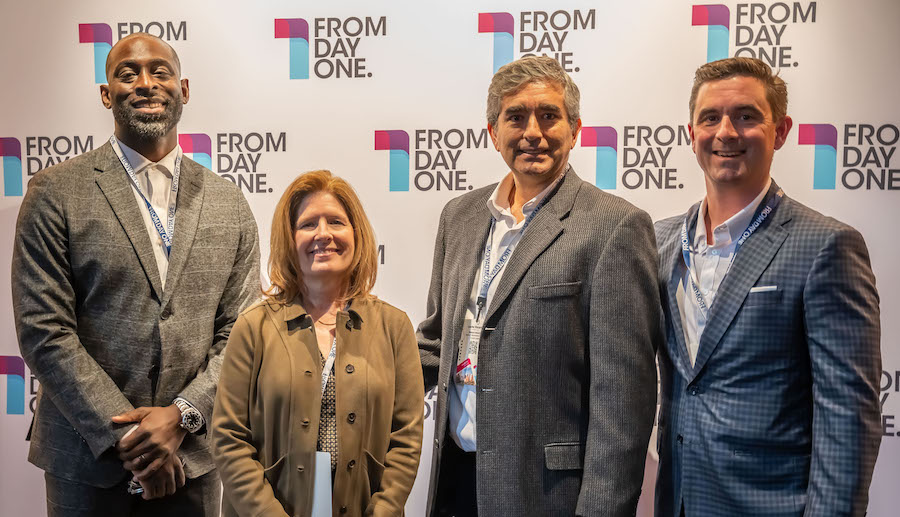Putting Well-Being at the Forefront of Company Values


Management can support employees and their well-being by encouraging them to take PTO, sabbaticals, and other breaks without fear for their standing and career advancement.
In a discussion moderated by Matthew Kitchen, editorial director of the Houston Chronicle, at From Day One’s live event in Houston, a number of top employers offered these and other solutions.
But managers must accept that employees all have different needs, says Michele Gest, senior vice president, total rewards, LyondellBasell. Employers need to make adjustments to their approach and ensure the solutions are “more personal,” she said.
“What I think this COVID time has done is kind of open a window into people's lives that maybe we didn't have before,” Gest said. “I think when you really take the time to know people, then you can set certain things right that maybe you couldn't before.”
Finding different methods for addressing employees’ needs is an important task for managers, she says. “We had to be real creative” in approaching solutions and in how “we think about things as a company and what's important and how we try to meet the needs of different people,” Gest said.
Since LyondellBasell manufactures chemicals, it had previously taken a conservative approach to encouraging work from home, but its management has since gradually shifted its mindset and is now allowing employees to work from home three days a week.
“But we're certainly, I think, being challenged in the recruiting space,” said Gest. “We haven't necessarily gone as far as 100% remote. And so I think that's where we're really seeing some of the challenges.”
Employers need to find new solutions instead of relying on previous stand-bys, says Lucho Vizcardo, head of international human resources, Western hemisphere, Nabors Industries.
“We need to start thinking out of the box,” he said. “But these last two and a half years we’ve needed to keep up with the pace, which is not bad. I truly believe that, at least personally, I learned a lot.”
When managers stress the importance of wellness, whether it’s mental, physical, emotional, financial, or professional, they should lead by example, says Kojo Mensah-Bonsu, global director of diversity, equity and inclusion, CDW.
Managers can be proactive by adopting small solutions, such as allowing employees to skip being on camera during video calls.
“It doesn't sound like it is impactful, but there are leaders who demand that everyone stay on camera,” he said. “But, on some days, folks don't want to be seen, right?”
Encouraging employees to take advantage of the benefits a company offers, such as time off for mental health days, is also crucial, Mensah-Bonsu said.
“If I know someone is going through something or if I can tell just from body language, I'll extend that offer to them,” he said. “We’ve got this available to you; take full advantage of it.”

When employees hear stories about their managers using those benefits, it makes a larger impact.
“When people in your organization hear that coming from the leader, and you share vulnerability, that’s a big thing,” said Mensah-Bonsu. “If I talk about taking a personal day for something that has gone on in my life, and that benefit is afforded to everyone in the organization, I think it goes a long way. And so does expressing the impact and value of these behaviors. Making that known is pretty impactful.”
HR leaders are wrestling with how often employees should work in the office and what a hybrid model should look like in order to build culture, define purpose, and develop new team members, says Jamie Walsh, benefits and risk consultant, Anco Insurance. But instead of focusing on where employees are working, Walsh says, the priority at his company lies with targeting presenteeism.
“We believe that if the employee is present, then they're engaged, they're healthy,” he said. “If they're present, they're going to be productive, and productivity equals profitability.”
The emphasis is on giving employees the tools they need to work efficiently.
“So, that's really what we're focused on: supporting them, giving them what they need, and not being so focused on the definition of where they're working,” Walsh said. “We really want to help them be present as an employee.”
Ellen Chang is a freelance journalist who is based in Houston and writes articles for U.S. News & World Report, TheStreet, Kiplinger’s and Bankrate. Her byline has appeared in national business publications, including USA Today, CBS News, Yahoo Finance and MSN Money.
The From Day One Newsletter is a monthly roundup of articles, features, and editorials on innovative ways for companies to forge stronger relationships with their employees, customers, and communities.